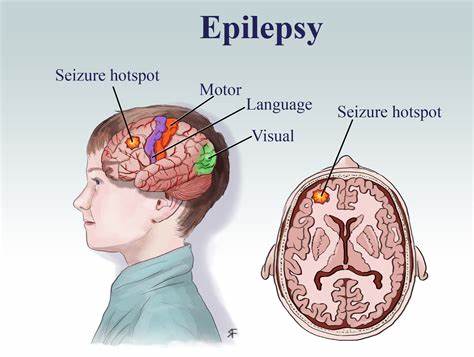Epilepsy
Epilepsy is a chronic neurological disorder characterized by recurrent, unprovoked seizures. It affects millions of people worldwide, crossing all ages, ethnicities, and socio-economic backgrounds. This condition disrupts the normal electrical activity in the brain, leading to a variety of symptoms that can range from brief lapses in attention to severe convulsions. While the experience of epilepsy can differ greatly among individuals, the fundamental issue lies in the brain’s tendency to produce sudden bursts of electrical activity, which can disrupt normal functioning.
What is Epilepsy?
Epilepsy is not a single disease but a syndrome that can have multiple underlying causes. Seizures are the primary symptom of epilepsy and can vary widely in their presentation. The condition is diagnosed when a person has two or more unprovoked seizures, which means that the seizures are not triggered by an external factor such as a high fever or a specific event.
The brain’s electrical activity is regulated by a complex network of neurons communicating through electrical impulses. In epilepsy, this system becomes disrupted, leading to abnormal electrical discharges. These discharges can spread through the brain, affecting various functions depending on the area involved.

Types of Seizures
Seizures in epilepsy are classified into several types based on their origin and the areas of the brain affected:
Focal Seizures
Focal seizures begin in one brain area, with sensory, motor, or autonomic symptoms, and may involve preserved or impaired consciousness.
Generalized Seizures
Generalized seizures impact both brain hemispheres, including tonic-clonic, absence, myoclonic, and atonic types, each with distinct symptoms.
Unknown Onset Seizures
When a seizure’s beginning is unobserved or unclear, it is classified as unknown onset. This category helps in further evaluation and diagnosis.
Causes of Epilepsy
Genetic Factors: Some forms of epilepsy are inherited and result from mutations in specific genes. Genetic predispositions can make individuals more susceptible to developing epilepsy.
Brain Injury: Traumatic brain injuries, such as those resulting from accidents or falls, can lead to epilepsy. This includes injuries sustained during birth.
Infections: Certain infections, such as meningitis or encephalitis, can damage brain tissue and lead to epilepsy.
Stroke: Strokes can cause damage to areas of the brain, which may result in seizures.
Tumors: Brain tumors can disrupt normal brain function and lead to seizures.
Developmental Disorders: Conditions such as autism or neurodevelopmental disorders can be associated with epilepsy.
Treatment and Management
Managing epilepsy often requires a comprehensive approach that includes medication, lifestyle adjustments, and sometimes surgical intervention. Treatment options include:
- Antiepileptic Drugs (AEDs): Primary treatment for epilepsy, stabilizing brain activity. Medication choice depends on seizure type and patient health.
- Lifestyle Modifications: Avoid triggers like stress and lack of sleep to manage seizures. Regular sleep and stress management are key.
- Surgery: For drug-resistant seizures, surgery may be an option, such as resection or laser ablation targeting the seizure source.
Vagus Nerve Stimulation (VNS): This treatment involves implanting a device that stimulates the vagus nerve, which can help reduce the frequency and severity of seizures.
Responsive Neurostimulation (RNS): This involves implanting a device that detects seizure activity and delivers electrical impulses to stop the seizure before it fully develops.
Ketogenic Diet: A high-fat, low-carbohydrate diet may be beneficial for some individuals, particularly children, as it can help control seizures.
Research and Future Directions
Ongoing research aims to improve our understanding of epilepsy and develop more effective treatments. Advances in genetics, neuroimaging, and neurostimulation technologies are paving the way for personalized treatment approaches and better management strategies.
Genetic Research
Studying the genetic basis of epilepsy can result in the development of targeted therapies and more accurate diagnostic tools.
Neurostimulation Innovations
Research into more sophisticated neurostimulation techniques holds promise for enhancing treatment efficacy.
Novel Medications
New antiepileptic drugs and delivery methods are being developed to improve seizure control with fewer side effects.
Conclusion
Epilepsy is a complex and multifaceted disorder with a significant impact on individuals and their families. Understanding the types of seizures, their causes, and the available treatments is crucial for effective management. Through ongoing research and advancements in medical technology, the future holds promise for improved treatments and a better quality of life for those living with epilepsy. Whether through medication, lifestyle changes, or innovative therapies, the goal remains the same: to provide individuals with the tools and support they need to lead fulfilling and productive lives despite their condition.